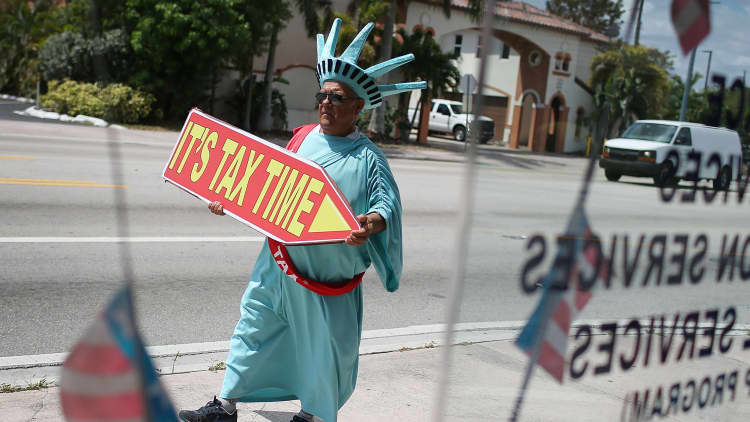Taxes are due tomorrow, and if you don't file and pay your taxes, you could face some consequences.
Everyone's tax situation is different, but here are some of the things that might happen if you don't submit your 2016 tax returns by the filing deadline of Tuesday, April 18.
First, there are different penalties for not filing your taxes and not paying them, says Lisa Greene-Lewis, certified public accountant and TurboTax blog editor.
- If you don't file, you'll face a failure-to-file penalty. The penalty is five percent of your unpaid taxes for each month your tax return is late, up to 25 percent. On top of that fee, if you file more than 60 days late, you'll pay a minimum of $135 or 100 percent of the taxes you owe (whichever is less).
- If you file your taxes but don't pay them, the IRS will charge you a failure-to-pay penalty. The penalty is 0.5 percent of your unpaid taxes for each month you don't pay, up to 25 percent. Plus, you'll owe interest on the unpaid amount.

Greene-Lewis also notes that if you fail to file, the IRS may file a return on your behalf: "The IRS can get copies of your income forms — your W-2 or 1099-MISC — and they'll do it for you." However, it's best to file yourself because you might be eligible for tax deductions and credits that the IRS doesn't know about, she says.
In short, even if you're only a couple of months behind on your taxes, the consequences can pile up in the form of fees and interest. And the longer your taxes go unpaid, the more costly it'll be.
Plus, you may miss out on a refund by not filing. "The IRS reports every year that they have close to $1 billion in unclaimed refunds," says Greene-Lewis. "And those [unclaimed] refunds are averaging about $700. That's a lot of money."

If you continually ignore your taxes, you may have more than fees to deal with. The IRS could:
- File a notice of a federal tax lien (a claim to your property)
- Seize your property
- Make you forfeit your refund
- File charges for tax evasion
- Revoke your passport
So, if you haven't done so already, get started on your 2016 tax returns.
Don't miss: A single mom used her tax refund to pay her rent—for the entire year


